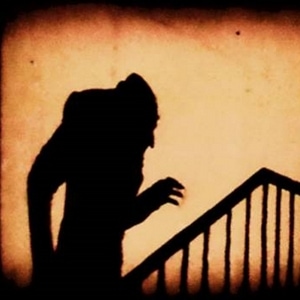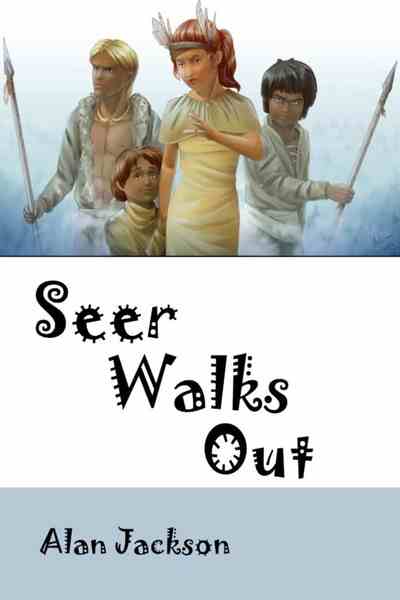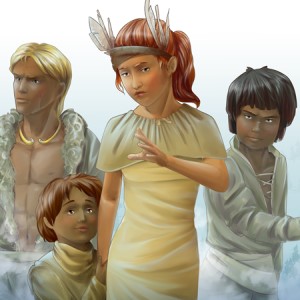I did get back to the others before dawn – just. Hawk was already stretching a long arm out from under his cloak; Stack of course was still sleeping. Sleeping like a log, except that Stack does everything like a log.
“There is much evil abroad in these woods,” I panted. “Bad spirits must have learned of our journey. I have fought most of the evil off, and the rest will not hurt us by day, but it has taken much of my strength. We must not be on this hill at nightfall.”
Hawk nodded, rubbed his eyes and began pulling himself together. I toed Stack in the ribs until he woke, and then collapsed against a tree. I wasn’t pretending, for once; I was exhausted. They let me sleep for a couple of hours unguarded – thank you boys – while they caught some breakfast. Then we set off again.
Nearby, just above where we had camped, there are two long furrows in the ground, less than half a pace wide and about five paces apart, but running together at that same separation for thousands of paces. Southwards they cross almost over the very top of the next hill, and then fade out; northwards they go down into the Grey Bog and beyond our Tribe’s knowledge. Between them there’s just thin twiggy stuff, fireweed and grey grass; as though the furrows have drained the goodness out of the soil. They are strange, I admit, but they must simply be natural; what tribe would spend so much effort over so long a period digging for no purpose? And while the Elders – if they ever existed – are said to have had strange powers, again, why waste those powers on something so futile?
Anyway, they make a way which is easy to follow and quick to walk. And therefore tempting for an ambush; which is why we call it the Deathway, and why we’d avoided it so far. But I had convinced the others we needed speed, Stack said he wasn’t worried anyway, and I was sure everything was safe, so we chanced it.
Wrong.
One stone thumped off Stack’s hipbone and the other caught my shoulder, almost snapping my collar bone. We leapt back against the only defensible point – a pair of tree trunks that had fused together to above man height. Stones flew at us; just two stones. Were there really only two attackers?
And I would have something to say to the Valley shaman if we ever got back.
Hawk and Stack crouched down, shoulder to shoulder, their packs in front as shields, Stack’s left shoulder against the tree, Hawk’s spear under his armpit with its butt jammed against a tree root. It all went very quiet. I tucked myself in behind them, and considered.
The wind was blowing along the Deathway from us to them, and the whole patch was ankle deep in dead pine needles. I crawled out from behind Hawk, opened my firepot, and lit the needles. The result was most gratifying: a huge bank of thick smoke rolled out along the track, smothering the bushes and trees – and everyone in them. Three voices were soon coughing their lungs apart, and three blackened figures stumbled out of the smoke, hardly able to hold up their spears.
My two boys seemed frozen to the spot, so I ran out and snatched our enemies’ spears from their hands.
“Kneel!” I commanded.
They were in no state to disobey.
Apparently we couldn’t just kill them because it hadn’t been a fair fight. (I will never understand how boys’ minds work.) So I fetched their stuff, while Hawk stripped off their loincloths to blindfold them with, and Stack tied their thumbs together behind their backs with thongs from their packs and tied more thongs chaining them together elbow to elbow – a bit overcomplicated, I thought; I’d’ve just tied them together by their wrists. Then we picked up some sticks and beat them till they ran. We managed to run them to a viciously steep slope, and then we didn’t need to beat them any more – they had to run down or fall down. They did very well. They got a good ten paces down before one of them tripped and brought the others down, rolling and somersaulting and sliding and bouncing down a hundred paces down until the slope levelled out. We were a good way away at the top of the slope, but we reckoned there were at least one broken arm, one broken ankle, and one dislocated shoulder, and probably a couple of broken ribs and collar bones. And Stack’s thongwork had paid off, too; they seemed to have real problems untying themselves or doing anything with their hands – they couldn’t even manage to get the blindfolds off, at least while we were watching.
It was a really good laugh. But we had to leave them and get on.
“So even our shaman thinks our chief can’t fight,” remarked Stack.
Oops.
There were a dozen things I could have said to fix the situation. I managed not to think of any of them.
“I can fight,” retorted Hawk. “I can fight you if you want it. Do you want it?”
“Yes!” Stack began to inflate himself, in that stupid way boys have when they’re trying to look big. “I want it! I want it now!”
“OK!” I called. “No weapons, we’ll draw a square, and the first one to touch ground outside the square loses, and agrees the other one is chief. You swear by the Spirits. OK?”
“OK!” they both trumpeted. Hawk threw his things over to one side, Stack his things to the other, while I drew a square in the pine needles and desperately tried to think of a way out. Before I’d finished they were already circling, face to face, fists clenched. I swore. It didn’t matter which one won; we’d lose the other: and I had to admit Hawk had been right; we needed to be three.
And I thought that was my biggest problem. I was wrong. I had forgotten the fire.
Or rather, I had assumed it had gone out, since the smoke and flame had died, and I was so engrossed by our games with our captives and then the stupidity of my boys that I never bothered to check.
Until there was a sudden roar behind us, a great roil of smoke on our backs, two foxes legging it out of the scrub across the clearing and out, and a crackling noise not far enough away. We all jerked round to see. Then, before we’d thought, a huge wild boar crashed into the clearing, galloping right at Stack. Stack tumbled almost out of the way, spinning to the ground as the boar slammed into him. Hawk seemed to freeze for a split second, then dived for his weapons. He threw his knife into the boar’s shoulder, then dropped to one knee and held a spear butt to the ground as the boar turned. The boar flung itself at him, onto the spear, slid right up the shaft, and gnashed its tusks at Hawk’s shoulder. Hawk twisted himself one way, trying to push the spear the other way, but the boar twisted as well, still impaled on the spear, and landed on top of Hawk, biting at his face. But now Stack’s spear took the boar in the ribs, and rolled the boar clear. It landed on its back, and Stack smashed its head in with his club.
The boar was dead. The fire wasn’t.
It seems longer when you tell it, but killing the boar had taken less than half a minute all told. I ran towards the smoke, and dragged the dead branches back away. The lighter stuff I flung aside into the woods; the heavier I dragged to one side. Stack saw what I was doing and took over the heavy branches – one-handed – while I swept as much of the dead leaves and needles aside as I could.
A little bit of fire reached the clearing for us to stamp out, and a crackling noise moved on past us to our right, but nothing flared up again. I imagine the evening rain put it out.
Stack had no more than a wrenched shoulder where the boar had first hit him, but Hawk was badly gashed; four or five of the hoofcuts on his body were nasty looking, and the tusks had got him in the shoulder and down from the cheek across the jawbone. Work for me. My stitching must have hurt, but Stack was watching so Hawk never made a sound. He did drop a tear once, but said I was tickling him, staring at Stack to dare him to contradict.
Boys.
Anyway, I stopped the bleeding, put the skin back and generally fixed him up, but he would carry the scars for life. As a matter of fact I think he was quite proud of them. Even I thought the one on his jaw made him look tougher, more grown up, sexier almost. I wasn’t stupid enough to say so, of course.
When I’d finished, he stood up. So did Stack.
“Thanks,” said Stack, gruffly. He held out his hand.
Hawk took it. “What for?”
“You fought well.” It was like squeezing water from a rock, but Stack said it. “You saved my life. Thanks… chief.”
Hawk put an arm round Stack’s shoulders and they embraced. “You fought well, too. You saved my life. Thanks.” Then he pushed Stack away, and looked in his eyes. “Not chief. Friends. Shoulder to shoulder, spear to spear.”
“Spear to spear,” echoed Stack, and they embraced again.
Meanwhile I was trying not to be sick at this ludicrous display of sentimentality, and wondering what it implied. There’s no such thing as equality. How was this going to work out if Hawk wasn’t recognised as Stack’s chief? Would Hawk act as chief anyway? Would Stack take over as leader? Would either of them even notice?
Was it my chance to take over as shaman and chief? No, not yet, I decided. One day, but not yet.











Comments (0)
See all